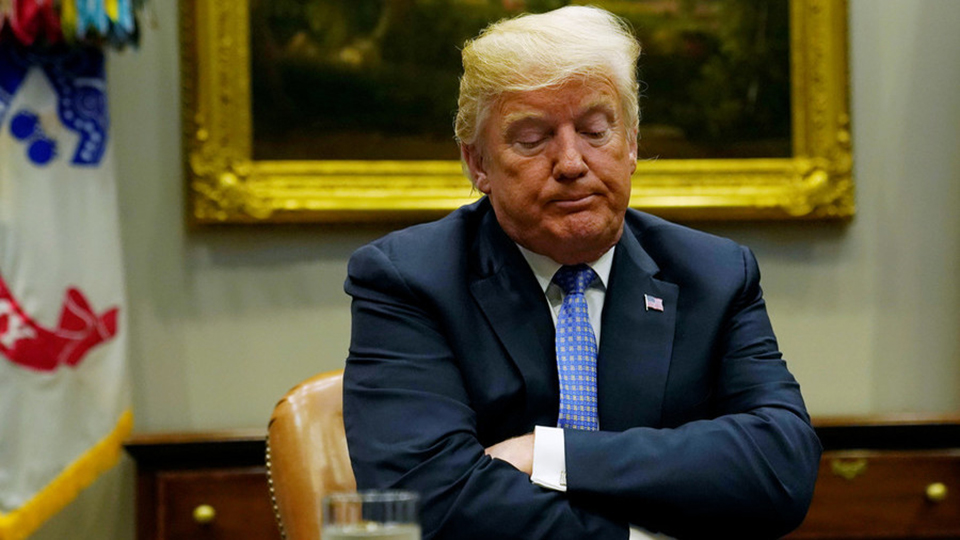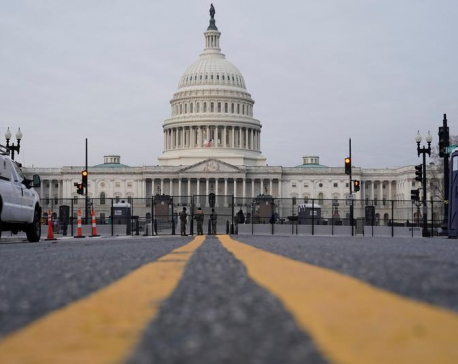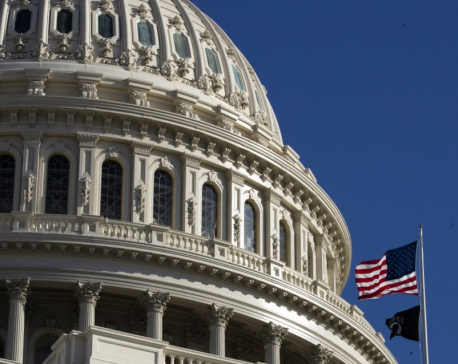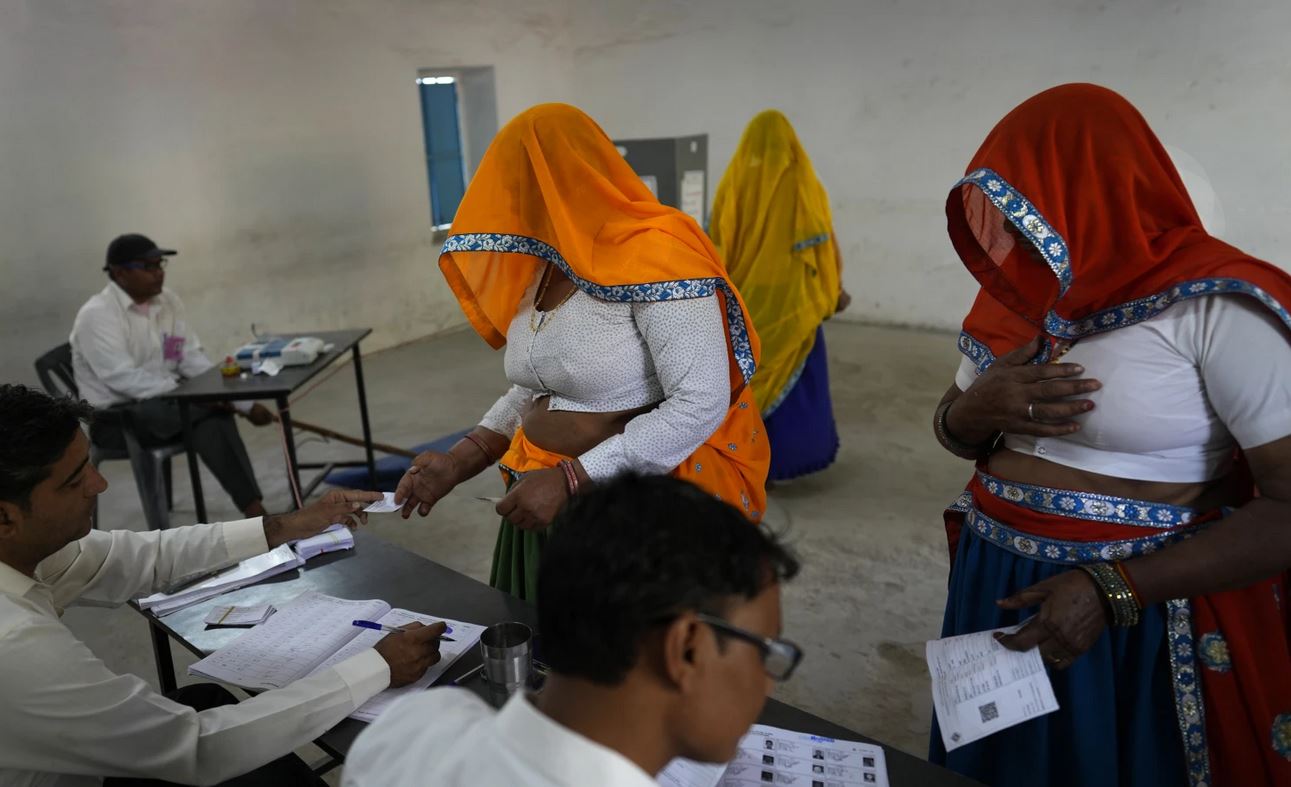
OR
Trump impeachment: Is it possible – and how would it play out?
Published On: August 24, 2018 12:32 PM NPT By: Agencies

WASHINGTON DC, Aug 24: Michael Cohen’s testimony on Monday, that he broke campaign finance laws at Donald Trump’s direction, has renewed calls for Trump’s impeachment or even his removal – but is that likely, and what would actually happen if it did?
Impeachment?
Without doubt, Cohen’s testimony increases the chances that Trump will face impeachment – but it is not quite as simple as that. Cohen’s testimony is not the only factor which will determine how the coming drama will play out. In essence, much rests on what happens on November 8th – the midterm congressional elections. That day could quite possibly determine Trump’s fate as president.
So, how bad do things look for Trump?
Former US diplomat Jim Jatras told RT that the chances of impeachment currently stand somewhere at “about 65 percent and growing” but said that number could go up or down based on what happens in November. If the Democrats manage to take back control of the House of Representatives, the “odds of impeachment go up to at least 85 percent,” Jatras predicted. If Republicans retain the House, Trump will be in a much safer position.
In contrast, Brussels-based Russian affairs analyst Gilbert Doctorow told RT that the chances of impeachment are effectively zero “until and unless” the November elections give Democrats back control of the House.
Bill Clinton’s impeachment in December 1998 set the precedent and makes it likely that Trump will be called to testify in the civil suit brought by adult film actress Stormy Daniels, US journalist Dave Lindorff said. Lawyers will try to create a “perjury trap” similar to the one Clinton fell into which could lead to impeachment, he added.
Removal from office?
Impeachment is one thing, but there has also been talk of the possibility of Trump being fully removed from office. This is a far more difficult task for Democrats who want to get rid of Trump once and for all. Removal from office would require a two-thirds vote in a Senate trial.
After Clinton was impeached on charges of perjury and obstruction of justice, he won his Senate trial and remained in office. Trump, on the other hand, “starts from a much weaker position,” Lindorff said, because he is “only backed by a minority of Americans according to polls”. His current average approval rating is at 43.5 percent according to Real Clear Politics.
Despite that weaker starting position, however, Democrats would still need “at least 15 Republican Senators to vote for conviction and removal from office, which would be a heavy lift” – and that’s if they had regained control of the Senate. If they failed to do that, it would be an even steeper hill to climb.
Jatras was more categorical about the chances of Trump being removed from office, however, arguing that “if the Democrats take the House, Trump will be impeached and removed, even if the Republicans retain the Senate.”
“Anywhere from a quarter to a half of GOP Senators would jump at the chance to put a knife in Trump’s back and get Mike Pence in the Oval Office and Nikki Haley in as VP, restoring the pre-Trump status quo ante,” Jatras said.
Whether any of this happens may all depend on what other information Special Counsel Robert Mueller has up his sleeve – or what else Cohen might decide to reveal to win a reduction or full removal of his jail sentence. “My guess is [Cohen] is going to sing like a canary to stay out of jail at this point,” he said.
What next?
Let’s imagine things go badly for Trump and he finds himself impeached and removed from office. What happens next? Well, we know one thing, at least. The person to replace Trump would be Vice President Mike Pence. But what kind of president would Pence be – and what kind of domestic strife would he be facing in post-Trump America?
Doctorow said that Pence “would not continue Trump's aggressive policies of tariffs and sanctions against US allies” – an assumption that seems to be widely shared by analysts. When it comes to Russia sanctions, however, there is some disagreement among experts about what might happen next.
Doctorow suggested that, under Pence, the world could “expect the sanctions against Russia to be relaxed” because they have only been strengthened in recent months in an effort by Congress to “handcuff”Trump into implementing as many anti-Russia measures as possible. The sanctions are “anti-Trump much more than they are anti-Russia,”Doctorow said.
Lindorff said sanctions would probably be continued because it is “good for US arms manufacturers” to have the “Russia threat” pushed as much as possible. Jatras was more pessimistic, however, suggesting that sanctions would not only continue but could “vastly intensify” if Trump was gone – and not only against Russia, but against “other designated adversaries like Iran, North Korea, and Venezuela—not for economic reasons but purely as a form of warfare”.
In fact, Jatras suggested that Pence in office could mean that a “major global conflict” would be almost “unavoidable” given Pence’s more traditional foreign policy views which are more in alignment with the pro-war establishment. It is possible too, he said, that Trump could even do something “reckless” regarding Iran “in a desperate bid to save himself”.
Domestically, there would be huge challenges for Trump’s successor, too. Politically, Pence could find himself in an even weaker position than Trump, given that his strict religious views mean Evangelicals make up his support base – and they are a small group.
Lindorff suggested that Pence would “totally lose the support of some key liberal or middle-of-the-road Republicans in both House and Senate, who would not be able to support his rigid stands on things like abortion, gay rights, etc. that Trump gets a pass on.”
Domestic strife is also a distinct possibility, given large swathes of the population may not sit back and accept that Trump had been removed from office legitimately. It is certainly possible that such a dramatic end to the Trump presidency could result in political unrest and even violence.
Perhaps the most significant result, however, would be how determined the “Republican-Democrat duopoly” would be to prevent anything similar ever happening again.
The establishment would do everything in its power to “make sure that no future accidents happened, that no ‘unapproved’ populist will ever again break through" – and the US political system will be “every bit as immune to reform as the USSR in the 1980s, except with two nominal parties, not just one,” Jatras said.
You May Like This

Senators vote to proceed with Trump's impeachment trial, but conviction may be elusive
WASHINGTON, Feb 10: A divided U.S. Senate voted largely along party lines on Tuesday to move ahead with Donald Trump’s impeachment... Read More...

Crimes? Impeachment prosecutors, defense lay out arguments
WASHINGTON, Jan 20: President Donald Trump’s defense team and the prosecutors of his impeachment are laying out their arguments over... Read More...




Just In
- Rainbow tourism int'l conference kicks off
- Over 200,000 devotees throng Maha Kumbha Mela at Barahakshetra
- Indians vote in the first phase of the world’s largest election as Modi seeks a third term
- Kushal Dixit selected for London Marathon
- Nepal faces Hong Kong today for ACC Emerging Teams Asia Cup
- 286 new industries registered in Nepal in first nine months of current FY, attracting Rs 165 billion investment
- UML's National Convention Representatives Council meeting today
- Gandaki Province CM assigns ministerial portfolios to Hari Bahadur Chuman and Deepak Manange






_20220508065243.jpg)








Leave A Comment